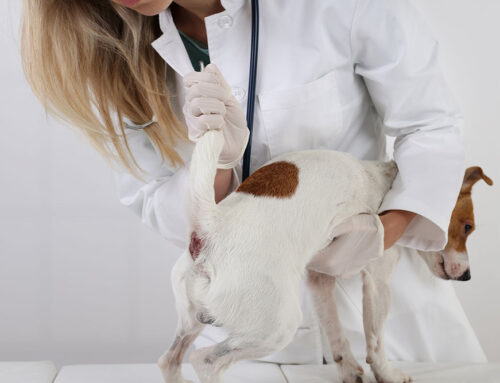When your dog isn’t acting like themselves—sluggish, not eating, maybe vomiting—it’s easy to assume it’s just a stomach bug or stress. But sometimes, the signs point to something much more serious: Addison’s disease, also known as hypoadrenocorticism.
At the Veterinary Emergency and Specialty Center of Northern Arizona, we often see dogs with Addison’s that go undiagnosed for too long—until a true emergency brings them in. The good news? With timely diagnosis and the right treatment, most dogs with Addison’s go on to live full, happy lives.
This guide will walk you through what Addison’s disease is, how to recognize the symptoms, how it’s treated, and what living with this condition means for your dog—and for you.
What Is Addison’s Disease in Dogs?
Addison’s disease occurs when your dog’s adrenal glands stop producing enough hormones, specifically cortisol and aldosterone. These hormones are critical for:
- Regulating stress
- Balancing electrolytes
- Supporting metabolism and blood pressure
Without them, your dog can become dangerously ill. In fact, an untreated Addisonian crisis is a true medical emergency that requires immediate veterinary care.
Learn more from Cornell’s Canine Health Center
Causes of Addison’s Disease
1. Autoimmune Disease (Most Common Cause)
In most cases, Addison’s is caused by the immune system mistakenly attacking the adrenal glands. Some breeds—including Standard Poodles, Bearded Collies, and West Highland White Terriers—are genetically predisposed.
More from Merck Veterinary Manual on causes and types
2. Other Causes
- Infections or tumors affecting the adrenal glands
- Trauma
- Sudden withdrawal from long-term steroid use
Recognizing Symptoms of Addison’s Disease
Addison’s can look like a dozen other things at first—which is why it’s often called “the great imitator.” Knowing the early signs can help you act fast.
Early Signs to Watch For:
- Lethargy or listlessness
- Loss of appetite
- Vomiting
- Diarrhea (See Cornell’s guide on canine diarrhea)
- Shaking or muscle weakness
- Weight loss
Signs of an Addisonian Crisis:
- Collapse
- Severe dehydration
- Low heart rate
- Shock
These symptoms require immediate emergency care.
Learn how to recognize a pet emergency
How Addison’s Disease Is Diagnosed
1. ACTH Stimulation Test
This is the gold standard for diagnosis. A veterinarian gives a synthetic hormone to test how well the adrenal glands respond. In dogs with Addison’s, cortisol levels will stay low.
Deep dive: Diagnosing hypoadrenocorticism in dogs
2. Routine Blood Work
Before testing for Addison’s, your vet may notice red flags on basic lab work, such as:
- Low sodium
- High potassium
- Low blood sugar
Learn more: Why blood work matters for your dog
Treatment Options for Addison’s Disease
Once diagnosed, Addison’s is treatable, but it requires a lifelong commitment to hormone replacement and regular veterinary monitoring.
Hormone Replacement Therapy
- Glucocorticoids (like prednisone): Replace missing cortisol
- Mineralocorticoids (like fludrocortisone or injectable Zycortal): Replace aldosterone to regulate electrolyte balance
During a Crisis: Emergency Care
An Addisonian crisis requires:
- IV fluids
- Electrolyte correction
- Steroid injections
Read more about crisis management
Long-Term Monitoring
- Regular blood tests
- Adjusting medication based on your dog’s stress levels, illness, or life changes
Life with a Dog with Addison’s Disease

Daily Care and Routine
Once stabilized, most dogs live normal lives. You’ll just need to:
- Administer daily or monthly medication (your vet will guide you)
- Avoid extreme stress when possible
- Stay consistent with feeding and exercise
Dietary Tips
- Offer a balanced diet that supports hydration and electrolyte stability
- Frequent, small meals may help some dogs with energy regulation
Exercise and Stress Management
- Light to moderate exercise is usually fine
- Avoid sudden stress or major changes in routine when possible
Why Early Detection Matters
Catching Addison’s early—before a crisis—can be life-saving. If your dog seems off and symptoms aren’t improving with basic treatment, ask your vet about screening for Addison’s. The test is simple, and the benefits of early treatment are enormous.
Let’s Work Together to Keep Your Dog Safe
At the Veterinary Emergency and Specialty Center of Northern Arizona, we understand how overwhelming it can be when your dog isn’t feeling well—and you’re not sure why. If you suspect Addison’s disease or your pet is showing symptoms, don’t wait. Contact us today for guidance or to schedule a diagnostic consultation.
We’re here to help you through the unknown with expert care, empathy, and clear answers.







Leave A Comment